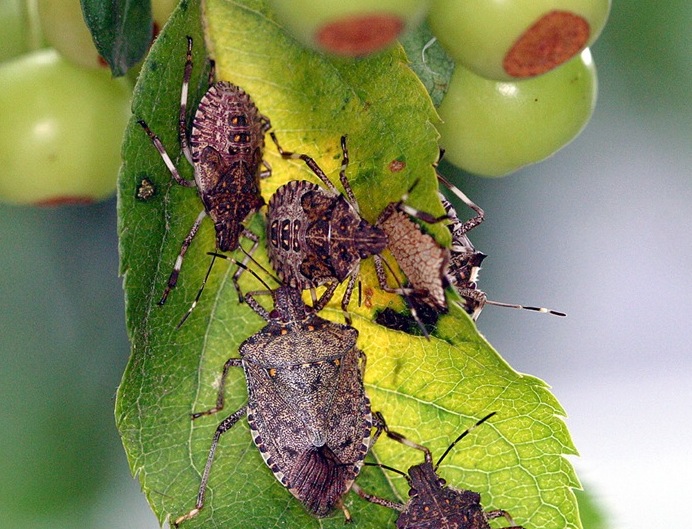About the Brown Marmorated Stink Bug in Organic Farming Systems Project
Brown marmorated stink bug (BMSB) poses a significant threat to organic production, and farmers have expressed an urgent need for effective organic pest management strategies. We have assembled a transdisciplinary team of organic researchers, farmers and extension educators that will coordinate the development and delivery of whole-farm organic management practices for BMSB and endemic stink bugs. This website will continue to evolve with the addition of social media to help organic farmers.

BMSB has proven to be one of the most devastating pests of Mid-Atlantic agriculture in the past 50 years. It was introduced into eastern PA in the late 1990’s and is now present in 40 states. Conventional farmers, who have access to powerful synthetic insecticides, have struggled to manage BMSB. The pest has a wide host range and has damaged a diversity of crops, including; tree fruits (apple, peach), small fruits (caneberries, grapes), vegetables (pepper, tomato, eggplant, sweet corn) and row crops (soybean and corn). With high populations in soybean, sweet and field corn, fruit and vegetables, BMSB has fully exploited the niche of diverse plantings common on organic farms near urban areas in the Mid-Atlantic and Southern regions.
BMSB has rapidly become a devastating pest of conventional and organic agriculture in Southern and Mid-Atlantic regions and is expanding to surrounding states. Management of this pest with conventional/synthetic insecticides has proven extremely challenging and there are currently no viable organic management tactics. The programs developed in our project will be based on BMSB dispersal and whole-farm movement integrated with core organic pest management strategies —i.e. conservation biological control, habitat manipulation and the use of trap crops and crop barriers.
Our specific objectives are:
- Develop habitat manipulation tactics based upon how host plant phenology impacts BMSB preference and dispersal.
- Determine biotic and abiotic factors affecting adult and juvenile BMSB whole-farm movement.
- Determine the identity and importance of extant natural enemies of stink bugs and their impact on BMSB populations.
- Evaluate integrated management plans for BMSB and endemic stink bugs specific to organic production systems.
- Develop and deliver extension materials for organic growers.
Click here to check out pictures from our first year!
Project Funding

This project was funded in 2012 by the Organic Research and Extension Initiative grant, part of the USDA National Institute of Food and Agriculture. Grant number 2012-51300-20097.


